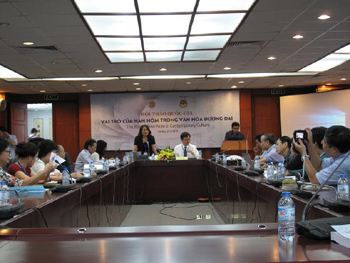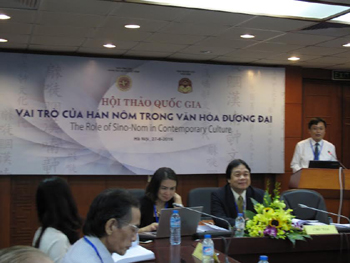Assoc. Prof., Dr. Dang Nguyen Anh, Vice President of VASS joined and delivered the opening speech in the conference. The conference witnessed the participation of about 200 people representing organisations and authorities at both national and local levels, including member Institutes of VASS, Hue Monuments Conservation Centre, National Archives Centre, Vietnam National University Hanoi, Vietnam National University Ho Chi Minh City, Hanoi National University of Education, Hanoi Metropolitan University, University of Da Lat, Hanoi University of Culture, Hanoi University of Drama and Cinematography, Hanoi University, University of Thai Nguyen, Vietnam Writers Association, Vietnamese Ethnic Minorities Art and Literature Association, Museum of Bac Ninh, and so on.
On his opening speech, Assoc. Prof., Dr. Dang Nguyen Anh, Vice President of VASS said this was the first conference aiming at assessing the role of Han-Nom in the contemporary cultural life of Vietnam. The conference also showed the special attention that VASS paid to research into Han-Nom within and beyond the Institute of Han-Nom studies. As the earliest and oldest source of Vietnamese handwriting, with the largest amount of documents discussing all the aspects of Vietnam in the past, the heritage of Han-Nom constitutes a significant part of the Vietnamese culture. The messages conveyed in this heritage are both the link between the past and the present, and the conservation of cultural, historical values imbued with national identity. It can be said that the issues of culture, history, beliefs, religions, philosophy, literature, arts, languages, science and technology, are all reflected in the heritage of Han-Nom, and hence should be maintained, conserved and socialized on a global scale.
 |
|
|
|
 |
In the current period, it is pressing for Vietnamese people to research into the past in order to draw lessons for the present, to single cultural elements out in the Han-Nom heritage which are helpful for the country’s sustainable development. In this sense, Assoc.Prof., Dr. Dang Nguyen Anh appriciated the idea, the purpose and the role of the Institute of Han-Nom studies in organising this national conference.
In his introduction speech, Dr. Nguyen Tuan Cuong, Director of the Institute of Han-Nom studies, Chief Organiser of the conference, indicated 3 panels of the conference discussing perspective topics as follows: Han-Nom in the cultural policy; Han-Nom with education and training; Han-Nom: from tradition to modern.
1, Han-Nom in the cultural policy. This Panel focused on assessing the role of Han-Nom in advising the cultural policy makers and managers at all levels. In particular, advising in the recognition and honour of national and international heritages (for example the set of administrative documents printed in Han-Nom by the Nguyen dynasty, known as ‘châu bản triều Nguyễn’, royal stamps of the Nguyen dynasty made of pearl and gems, known as ‘kim bảo ngọc tỷ triều Nguyễn’ and the likes); advising for the making of public policy on cultural management (regulations on new lifestyles, new village convention); management of cultural activities at local governments (various kind of traditional festivals, conservation and museology issues in the religious institutions such as conservation of orders of the royal honour stela, lacquered boards), displays and exhibitions of items printed and carved in Han-Nom (museum artifacts, exhibitions with particular themes); advising public policy makers and managers on intelectual tourism with regard to understanding of Han-Nom in historical relics, training tour guides (at the historical sites where authorities issue valued stamps, including Tran Temple, the Imperial Citadel of Thang Long, Ly Thuong Kiet Temple, Temple of King Hung, Kiep Bac Temple, Yen Tu Pagoda); advising for the making of public policy on restoration and embellishment of relics, estimation of artifacts; the role of experts in Han-Nom in the social-cultural orientation through communication.
 |
|
2, Han-Nom in education and training. This Panel discusses the assessment of education on Han-Nom undertaken at educational levels and in various forms of education in the purpose of offering recommendations and solutions. They include: Public education of all levels, from primary to post-graduate education; Other models of education: Education in the educational system of the Central Buddhist Association of Vietnam, private schools, on-line classes, and so on.
3, Han-Nom: from tradition to modern. This Panel concentrates on the continuation, development and enhancement of traditional values of Han-Nom heritage in the contemporary life and the implications. They include: practices of calligraphy, of beliefs, of feng shui and horoscope; doing religious rites; delivering art performance; Han-Nom in application of information technology.
Organisers of the conference received 53 register forms and summaries from 53 authors. Following a strict review, 48/53 were accepted, including 45 full paper written by 48 authors (18 papers provided by the Panel 1, 12 papers by the Panel 2 and 15 papers by the Panel 3). Amongst 48 contributors to the conference, there are 15 staff of the Institute of Han-Nom studies, 33 authors working in different institutions of Han-Nom studies and cultural management nationwide. These authors are all experienced and passionate about Han-Nom heritage.
The papers presented at the conference covered almost all the issues suggested by the conference’s organisers. Mainly, the papers were oriented toward advising the making of public policy in the contemporary regard, and hence satisfied a set of requirements of organisers. The authors suggested some recommendations for advising public policy makers on cultural management ( at the Panel 1), on management of education and training (at the Panel 2), and on particular issues relevant to Han-Nom heritage (at the Panel 3). These are principally useful opinions and ideas, based on the acute observations in the working practices, coupled with multi-disciplinary and inter-disciplinary knowledge of each author.
Overview of the opening ceremony
The conference has shown that Han-Nom studies have attracted an increasing attention not only of Han-Nom researchers, but also of professionals in other areas such as management of cultural activities, management of festivals, tourism, heritage, publication, information technology. Although some authors are not experts in Han-Nom, they still offered interesting views on Han-Nom from different approaches, and therefore, helped Han-Nom professionals to have a rare opportunity to ‘look at themselves through the lens of others’. This contributes to the originality of the conference.
The papers discussed outstanding cultural events regarding Han-Nom which attracted the attention of both social communities and the media. They are distribution of stamps at traditional festivals (Tran temple, the Imperial Citadel of Thang Long); calligraphy at the Temple of Literature and other cultural, spiritual spaces; the value of documents printed and carved in Han-Nom in research into Southeast Asia Sea and in struggle for sovereignty in Paracel and Spatly Islands, the role of documents printed and carved in Han-Nom in developing cultural activities, in enhancing and honouring all kinds of traditional Han-Nom heritage (stelae of doctorate at Temple of Literature Hanoi, lacquered boards of Nguyen dynasty, Vinh Nghiem lacquered boards, literature and architecture in Hue royal style, and so on).
The conference is also regarded as an effort to gather, connect experts in Han-Nom and other researcher of different disciplines all over country. In so doing, it aims at clarifying the role of Han-Nom culture in the social life of contemporary Vietnam, linking topical, political, cultural, educational issues of Vietnam with scientific research activities; establishing a forum where researchers, cultural activists and managers discuss the situation, the manner and the process of enhancing Han-Nom heritage in the contemporary life. The findings and explanations at the conference will be used as an important basis for the making of public policy with regard to relevant issues. By organising this conference, the Institute of Han-Nom studies has demonstrated its abilities in 3 aspects, including: abilities of basic research, abilities of public policy advisor, and abilities of educating and training in the area of Han-Nom and traditional culture. Among other things, advising public policy makers which is of significant importance should be significantly considered and further enhanced.
 |
|
|
|
 |
Overview of the sessions at Panels
In her closing remarks addressed to the participants, Assoc.Prof., Dr. Tran Thi An, Head of Scientific Management Department of VASS, confirmed that the conference was held in a professional and effective manner. At the same time, she recommended the Institute of Han-Nom studies to finish the report regarding the outcomes of the conference so that it will be soon submitted to the leaders of VASS in order to propose recommendations in advising public policy makers from the Communist Party of Vietnam and the Vietnamese State.
On behalf of the conference’s organisers, Dr. Nguyen Tuan Cuong expressed his gratitude to: leaders of VASS who interested in and directed the organising of this conference; leaders of member institutes of VASS who gave guidance and advice to the organisers of this conference in many aspects; to scholars, researchers from all over country who had positive contributions to the conference; to honoured guest who participated in the sessions of the conference; to the press who produced and spread news on the conference. Last but not least, his gratitude went to the staff of the Institute of Han-Nom studies, who had praiseworthy contributions to the conference by coordinating important activities and writing papers./.
Nguyen Thu Ha







